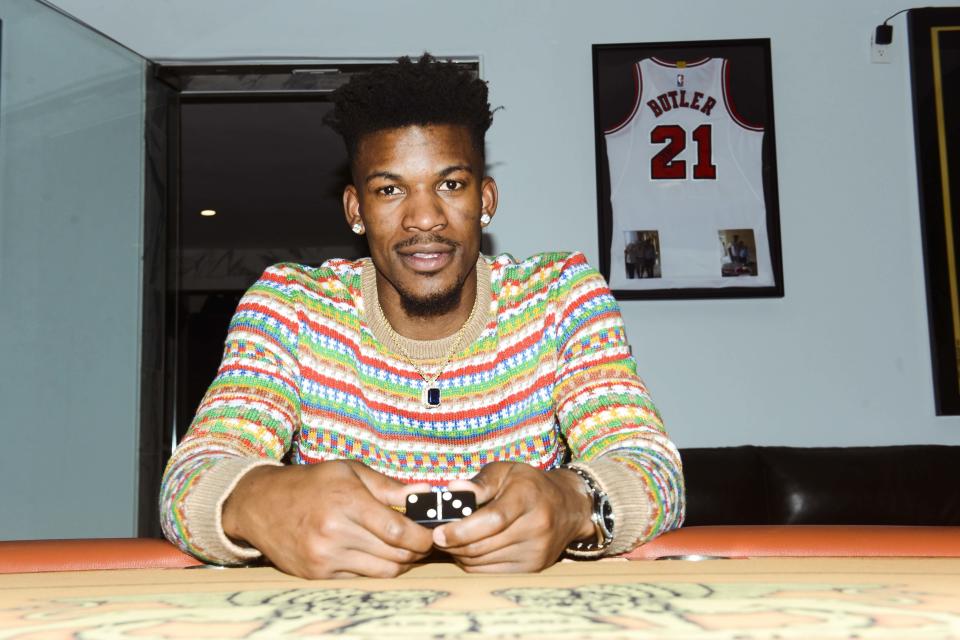Jimmy Butler Is Making It Up as He Goes Along
The day before he plays in his fourth straight NBA All-Star game, Jimmy Butler puts on 3 Doors Down and bounces around the bedroom of the Beverly Hills mansion he’s shacking in for the weekend. The wiry Minnesota Timberwolves star then switches to Nickelback’s “Photograph,” sweeping views of Los Angeles visible from the windows beyond his still rumpled sheets. His stylist, Khalilah Beavers, who also acts as a surrogate den mother—“Thanks, Mom,” Butler says when she insists on wiping the sleep out of his eyes—tries to focus Jimmy long enough to pick out some clothes for him to wear. I met him less than five minutes ago and have no idea if he’s serious about this ‘90s alt-rock playlist. His enthusiasm suggests it is, but Jimmy’s seemingly boundless energy can manifest in a tendency to fib. (Walking back downstairs, a photographer admires the deer wall fixtures flanking his staircase. “They’re actually antelope,” he says, launching into a backstory that very quickly ends when he admits that he’s making it up.)
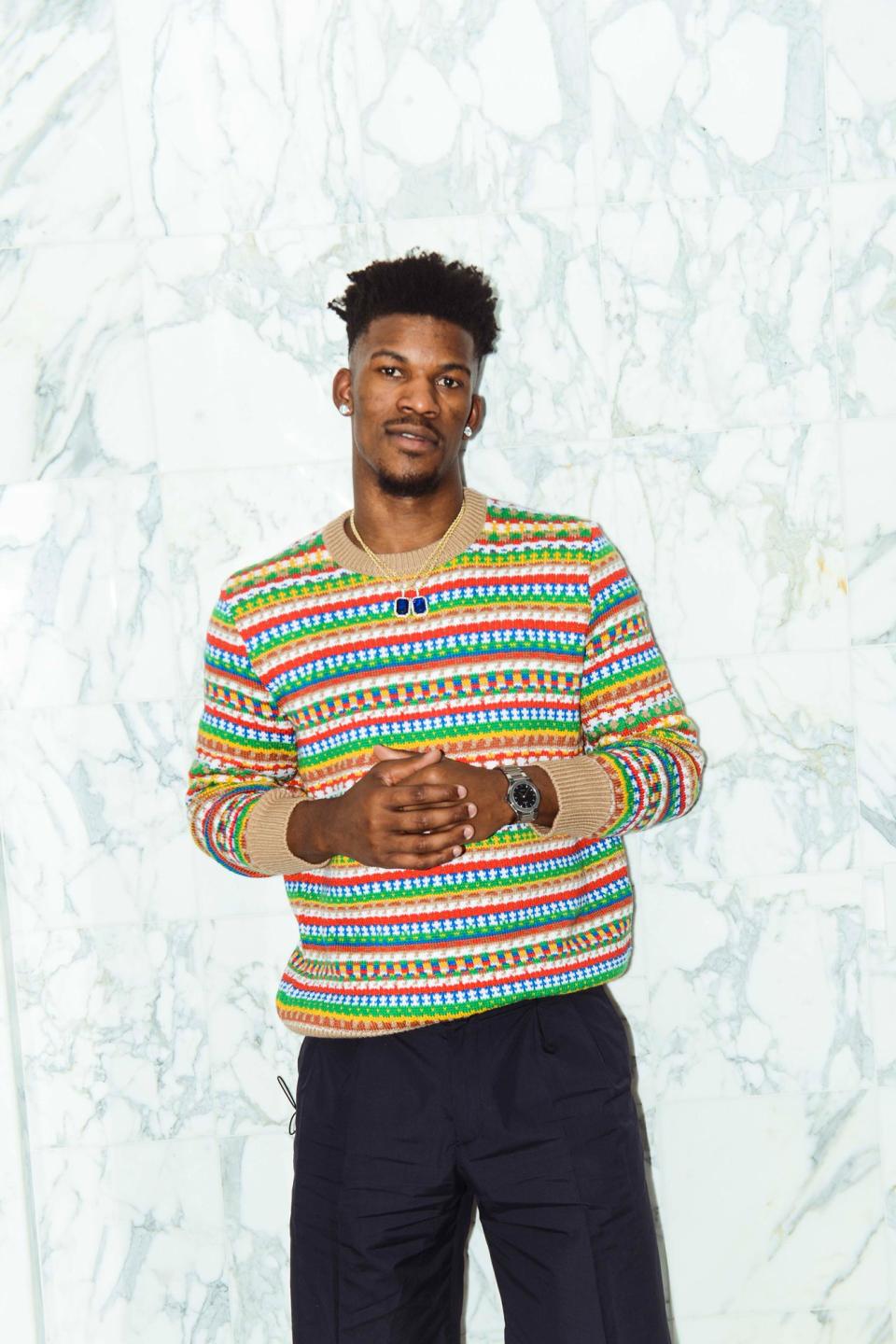

At least twice, I’ll hear him say, “You gotta take the crooked with the straights” out loud, to nobody at all. I just assume it’s an allusion to the particular conversation cocktail he serves up when he opens up about life before and beyond the NBA—equal parts jest and hard truth, wit and vulnerability. When I find out it’s actually a line from August Wilson’s “Fences” about taking the expected with the sudden misadventures life throws at you, it feels even more befitting of Jimmy Butler's story: From Tomball, Texas; kicked out of his home at 13; barely recruited, he had to play a year of ball at junior college before landing a scholarship at Marquette; the 30th pick in the 2011 NBA Draft, Butler played three seasons on the Chicago Bulls, before emerging, in his fourth, as a veritable superstar; and yet, despite his ascendance in Chicago, he was traded this offseason to Minnesota Timberwolves, a team he—along with teammate and fellow All-Star Karl-Anthony Towns—has quickly made relevant again. Now, he sits at an orange felt poker table covered in dominoes with “Jimmy Buckets” (his nickname) on the back, on the bottom floor of a three-story pad filled with close friends and business partners, one of the best two-way basketball players on planet Earth.
Sounds like something you might make up.

GQ: How long have you been playing dominoes?
Jimmy Butler: It's how I learned how to count—you count in multiples of 5 up to 150. I think that's why I love the game so much. It reminds me of growing up.
At what age did you first start playing?
[As] far back as I can remember. Like legit, this is how my dad taught me how to count. Now, all my guys, this is what we do. A lot of people are like, "I want to go to the beach, I want to go party, I want to go do this. I want to do that." We'll go on vacation, but we don't really care to go see Rome or anything. We just want to play dominoes. We like the fact that we can say, "Oh, we went to Rome." "Well, what'd you do in Rome?" "Played dominoes."
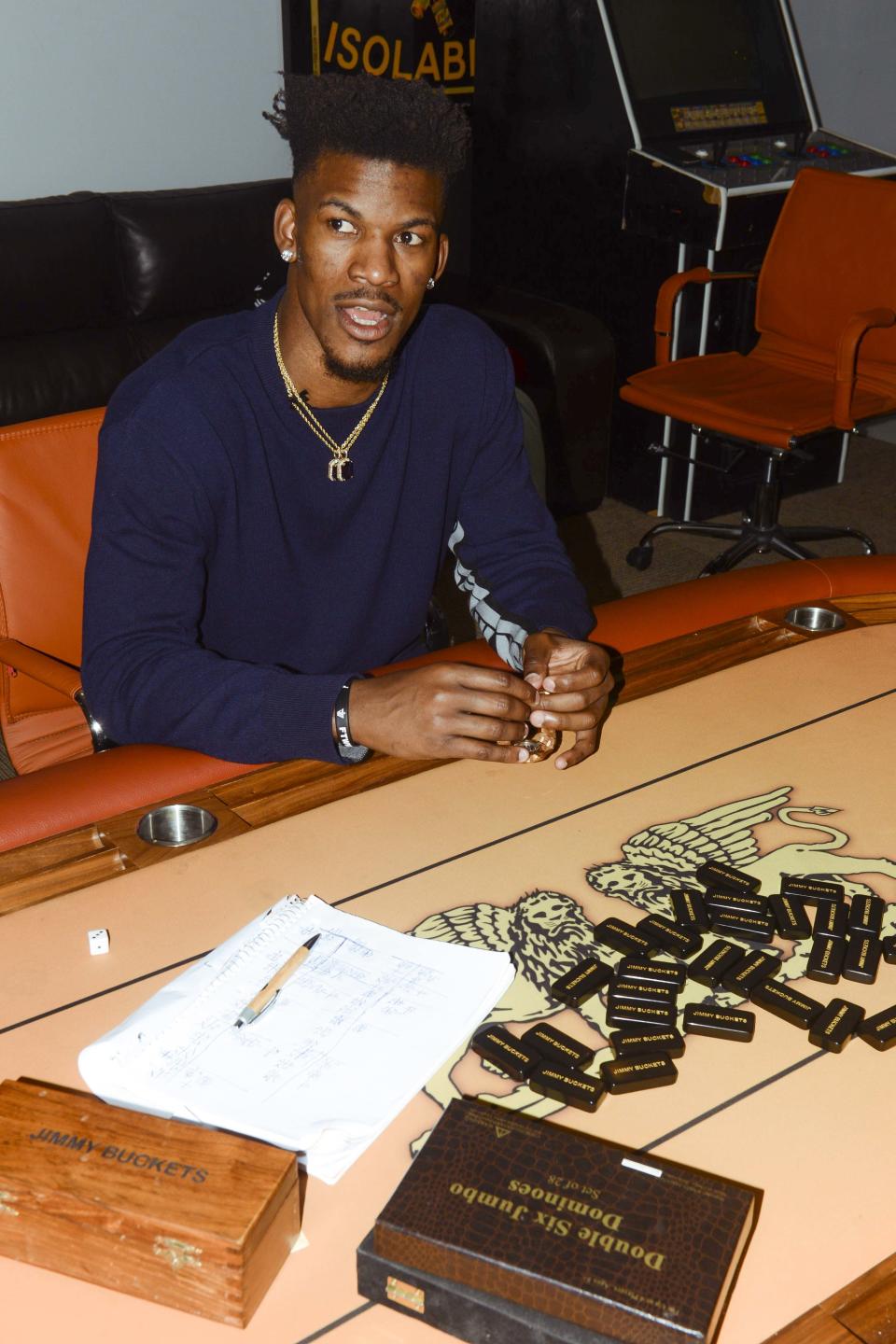
I feel like you are not as big of a social media guy as a lot of the other players
I'm not.
Why is that?
I'm boring. Like, legit boring.
You are not boring. I've been around you for ten minutes and even I know that's bullshit.
It you hang out with me for a day—[turns to a videographer on his team] what, more than anything, have you been capturing of what we do?
[Videographer: Just having fun.]
That's it! We joke around. We drink some wine. And we will sit at this table for ten hours playing dominoes. That's all we do. [If] somebody is like, man, I want to be an NBA player—you don't want to be me because my life isn't that interesting.
[someone sneezes]
I'm trying to do an interview over here! Don't let it happen again. Bless you, though, by the way.
How many hours a week do you think you play dominoes?
I do the same thing every day. Say it's a practice day. Practice at 11:00. Breakfast at what time? 9:15. We leave, go to practice, come back, play dominoes—if I don't take a nap—all the way up to dinner. After dinner, I play dominoes all the way until I go to sleep.
Game day. Shootaround's at 10. Breakfast at what time? 8:15. Leave, go to shootaround. After shootaround, if I'm tired, I take a nap until about 3:00. And then my food's ready at 3:30. So I play dominoes all the way up to 3:30. I eat. I play dominoes all the way until I got Bible study. And then I do Bible study. I go to the game. After the game, come home. Dinner. Dominoes until I go to sleep. I'm. Not. Joking.
So are you better at basketball or dominoes?
Dominoes.
How many people you think there are in the world that are better at dominoes than you?
Zero.
Goddamn. That's quite a proclamation.
I put that much time [in]. You can lose. Michael Jordan lost, but that doesn't mean he wasn't the GOAT.

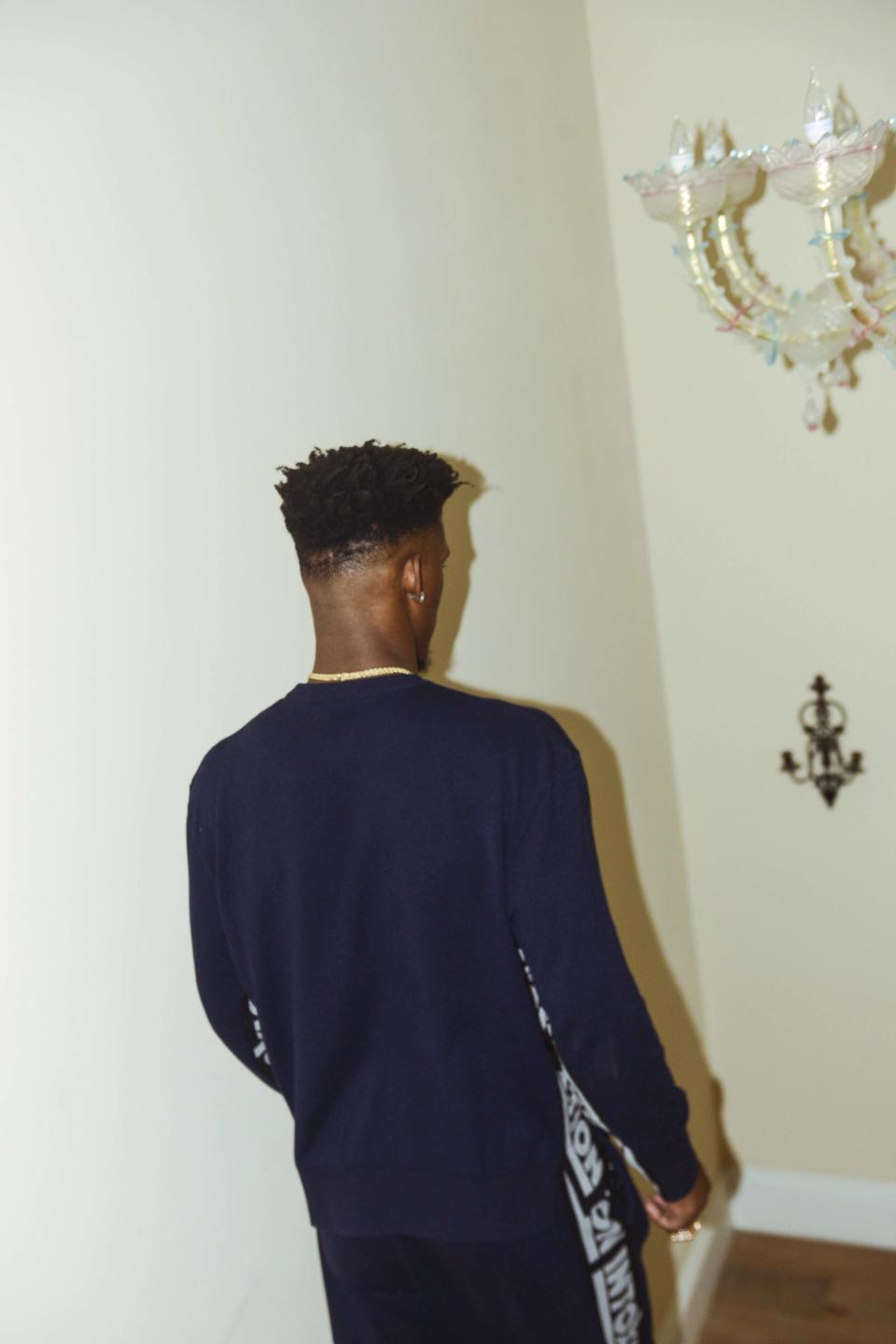
I do want to go back to the social media thing because on Bill Simmons' podcast, you and he talked about how basketball players are not just basketball players anymore—with social media and having a brand, you've got to be engaged with the audience all the time. I think that's also true with activism in a way it wasn't before, athletes are commenting on sociopolitical issues more than they ever have. I think we've seen that with LeBron's comments and response to Laura Ingraham in the last 24 hours. How much pressure do you feel to engage in that?
No pressure. If something is asked of me, I'll always do it. I always speak my mind. Whether it be something that's going on in the world, something on the basketball court, or just something I saw with somebody else that's not right. But those guys are on a much bigger platform. You see LeBron, his social media outlets, he's on it. Good for him. If somebody asks me about something, I'm speaking the truth on it. I don't think a lot of people ask me about it. But if they were, I would.
Do you guys talk about this together? I'm thinking back to the moment at the ESPYs with Dwyane Wade, LeBron, Melo, and Chris Paul. Do you guys have conversations about how to address these issues?
Not really. Because I think everybody has a lot of the same views on a lot of the same things. All of us being African-American males in today's society, it's been hard. Let's not sit here and say that it's not. So there's not too much to talk about. You just speak what's on your mind. And when you put all that together, you get everybody standing up there saying the same thing, but pouring your heart out, or [saying] how you feel because you have a young black son, a daughter, or whatever it may be.
You don't have kids do you?
I do not but I just take over my brother's kids, my trainer's kids, all that good stuff.
Have you had to have conversations with them about this?
Not yet. They're really young. I haven't had to talk with them about that. I don't think their fathers have had to talk to them about that. My brother's son is all of one year and a month old. But all the kids have iPads and are on the Internet and are paying attention to what's going on, so they're gonna ask questions. I think it’s our duty to fill them in on what's going on in the world when they ask.
And what would you say?
That it's hard out here. That it is. To tell you the truth, that they don't want young black men to be successful. Is it fair? Nah. Is the world fair? No. So you just show them the right that’s in the world. Because you can't just have anybody walking around hating anybody, so you just teach them, out of all else, just love. If you're loving somebody else, and they just continue to hate, you gotta let them be them. But we're not going to teach hate. I'm not going to teach hate to anybody. It's just not in me. If you just love somebody, no matter what, eventually it's gotta change. Smile. Do something great for somebody else and just pray that they pass it along to the next person. And for that second, the world is a better place. So you pass it on down the line. You just hope that peace is at the end of that line.
How'd you come to that philosophy—were you always like that?
I wasn't. But I've grown up. I've gotten so much more intelligent. Because I pay attention to a lot. I just never say a lot. I think a lot of times if somebody put themselves in somebody else's shoes, they'd be like, “Yeah, I don't think I would like that either.” But you know, a lot of people don't look at it like that. They're just like: this is the world that we live in.

Can you think of an example of a time when you did put yourself in someone else’s shoes like that?
When I was in middle school, I wasn't from the wealthiest family. The shoes that you had were the shoes that you did everything in. If you had to mow the lawn, you had a basketball game at 7 P.M., you had school at 8 A.M., those were the shoes that you always wore. I remember we had a little banquet, and the kids were making fun of me. “Look at his shoes!”
All I could think was: “That’s okay. One day, I'm going to be filthy rich, I'm going to be an NBA player”—this is literally how I'm thinking in 7th and 8th grade, not knowing it would actually happen cause I was terrible, fucking awful back in the day—“when I make it, I'm going to fly a fucking helicopter, I'm going to land that bitch on this football field, on my 10-year anniversary, and roll out a red carpet with roses.”
In my head, I had it all planned out and then I was like, they're kids. They don't know better. They're not thinking that they're hurting my feelings. They're having a good time with their friends. And luckily, I was so strong-minded that I was like, “Whatever. It's gonna happen. So what? Don't slap nobody, Jimmy. Don't slap nobody." And then I grew up and I realized I'd probably save some money by not landing a helicopter on a football field with roses.
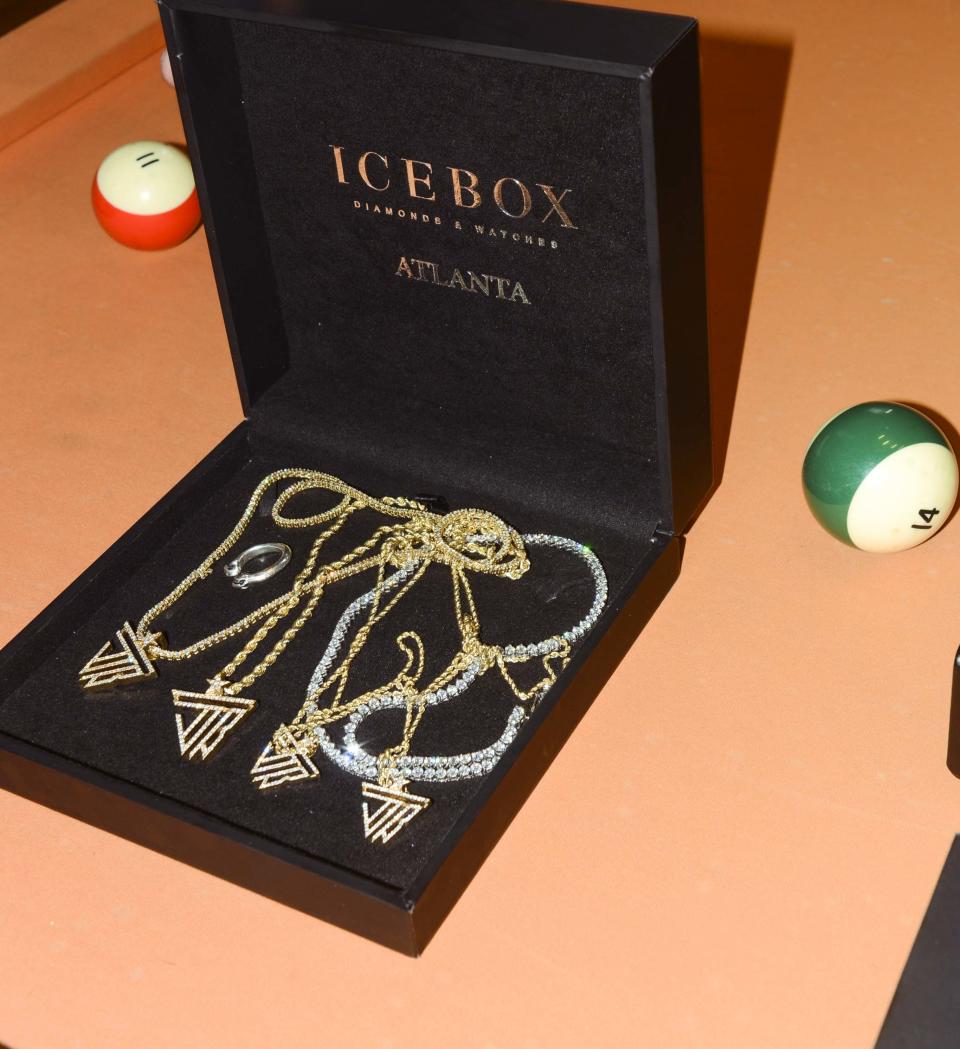
But you did get to wear the $20,000 Jordans on the court.
I don't know what you're talking about.
We're just not going to talk about that?
Yeah, naw, we're just going to skip over that.
Was there a pair of shoes that you held up as the shoe when you were younger?
Any pair of Jordan’s. Even though that wasn't the cool thing. We were in the country. So it was like cowboy boots and all of that. I wore cowboy boots, I used to. But I just wanted some Jordan’s just cause MJ was MJ, even football players like Randy Moss were wearing Jordan’s.
If I could talk to my 8th grade self, [I’d] be like, “Don't worry you'll have all the Jordan’s you could ever dream of. Just give it 12 years, or 15 years”—whatever, I'm not good at math—“you'll have to be like, man I can't even take these out the box, I've got too many, I've got to go put them in storage.” That wasn't in the cards for me. I just kept shuffling them until it was.
Do you remember getting your first pair of Jordan's?
One of my friends in 5th or 6th grade—RIP to him because he passed a couple years ago, his name was Cody Mann—his family was nice enough to buy me and my brother some Jordan’s. Think about that: for a kid, I ain't never had Jordan’s before, and I was so excited I didn't even want to wear them. I just wanted to look at them because I didn't want to mess them up. I wore 'em all of four times because I was trying to wait for the right moment where when I showed up, the [other kids] would be like, "Ooh, you don't got the same dusty ones you had on, you got on some new joints." And before you knew it, I couldn't even fit in 'em no more.
What is something that you know now that you wish you knew when you entered the league?
That it's okay to ask for help. I hate it when people go, "I can do it by myself. I got to do it by myself." You think that, and if you reach your goal, you're probably gonna be like, I did it by myself. But you probably had somebody help you, you just didn't consider it help. If you vented to somebody about your frustrations, that's help, because they're listening to you. [If] you ask somebody for $2 instead of $2000, that's still help.
I always used to go, "Oh, I'm gonna do this by myself," and I was like, "Yeah, I did it by myself." But I look back at it, and, man, [former Marquette head coach] Buzz Williams was always there for me when I needed somebody to talk to, or [former Tyler Junior College assistant coach] Scott Monarch, or the guys that I have now around me all the time. I look at it now, and I actually did have a lot of help. So it's okay to ask for help. You really can't get too many places by yourself. You gotta have somebody help you along the way.
How hard is it for you to trust people?
It's hard. But I'm not around too many people. And you know, people will look at me and the way I go about things sometimes and be like, "Man, maybe Jimmy is an asshole." I'm not. You just don't know me. The only thing that I know is I'm going to always be me. And if you're around me, and you know me, you know that my heart is pure. I never change. Don't wake me up. When I'm hungry, give me food. If you beat me in dominoes, you better talk as much shit as possible, because when I beat you I'm talking that much and more. I love being around my people. I don't care about too many things. But the one thing I do care about: I don't want anybody to say that Jimmy Butler is a bad person, he's just a bad guy. [You can say] I suck at basketball, I'm ugly, my hairdo is stupid, whatever. I can't be a bad human being. That's just one thing I can't go for.
This interview has been edited and condensed.
